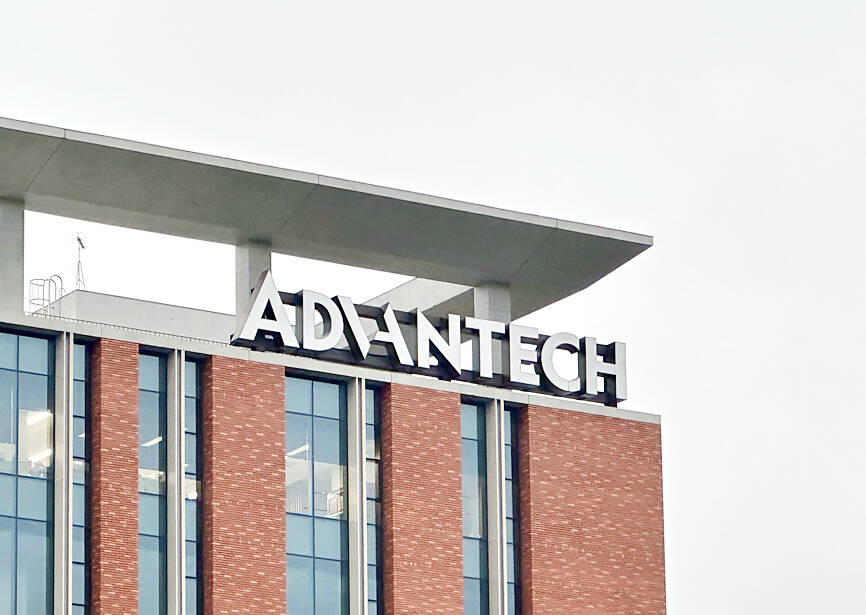Leading industrial PC maker Advantech Co (研華) plans to acquire Aures Technologies SA, a French company known for its point-of-sale (POS) and kiosk equipment, to expand its global coverage in smart retail products and services.
Advantech proposed to acquire 3.938 million Aures shares from the French firm’s major shareholder and through a public tender offer at up to 6.7 euros per share, the PC maker said in a statement after announcing the deal at the Taiwan Stock Exchange late on Friday.
The company aims to acquire up to 100 percent equity of Aures, a well-known brand in the western market with a strong presence for its POS equipment in Europe, Australia and the US, the statement said.

Photo: Fang Wei-chieh, Taipei Times
Advantech also plans to subscribe newly issued convertible bonds from Aures, totaling 5 million euros (US$5.35 million), to support its working capital, it added.
The companies expect to close the transaction following the completion of internal approval processes by both parties and regulatory approval from relevant authorities, the statement said.
The deal comes as the global retail industry has gone through significant challenges in the past few years due to the COVID-19 pandemic, supply chain disruptions, global inflation and interest rate hikes. At the same time, the rise of artificial intelligence and shifts in consumer behavior have spurred industry transformation and consolidation trends.
It has identified smart retail as a sector with significant potential and believes the deal would create greater synergy, as the two firms complement each other in terms of regional coverage, product portfolio and organizational capabilities, said Advantech, the first regional industrial PC vendor dedicated to smart cities and the Internet of Things (IoT).
Following the acquisition, Aures would maintain its independent operations, while Advantech assists in optimizing its management system, creating synergies through product roadmap integration, technical support and cross-selling initiatives, the statement said.
Advantech on Friday also reported net profit of NT$1.99 billion (US$61.1 million) for the January-to-March quarter, which was down 32.7 percent from a year earlier and 13 percent lower than the previous quarter.
Earnings per share were NT$2.32 in the quarter, the lowest since the second quarter of 2021, when it was NT$2.31 per share, while gross and operating margins declined to 40 percent and 13.8 percent respectively.
First-quarter revenue was NT$13.88 billion, down 20.21 percent year-on-year and 8.31 percent quarter-on-quarter, as the company’s business units — comprising embedded IoT, industrial cloud and video, applied computing, industrial IoT and service IoT — all underperformed with double-digit percentage declines.
By region, sales in Taiwan in the quarter outperformed other markets, with annual growth of 9 percent and shipments to China posted only a single-digit percentage fall on the back of transportation and semiconductor equipment-related projects, the company said.
However, sales to North America, Europe, North Asia and emerging markets registered double-digit percentage declines on an annual basis due to weak demand, it said.
Advantech said challenges of overall economy and regional markets remain severe for this quarter and customers are still conservative about placing new orders.
However, the anticipated acceleration of global manufacturing automation, smart energy and infrastructure upgrades is expected to further drive the company’s related new project shipments in the second half of the year, it said.

Nvidia Corp chief executive officer Jensen Huang (黃仁勳) on Monday introduced the company’s latest supercomputer platform, featuring six new chips made by Taiwan Semiconductor Manufacturing Co (TSMC, 台積電), saying that it is now “in full production.” “If Vera Rubin is going to be in time for this year, it must be in production by now, and so, today I can tell you that Vera Rubin is in full production,” Huang said during his keynote speech at CES in Las Vegas. The rollout of six concurrent chips for Vera Rubin — the company’s next-generation artificial intelligence (AI) computing platform — marks a strategic

Enhanced tax credits that have helped reduce the cost of health insurance for the vast majority of US Affordable Care Act enrollees expired on Jan.1, cementing higher health costs for millions of Americans at the start of the new year. Democrats forced a 43-day US government shutdown over the issue. Moderate Republicans called for a solution to save their political aspirations this year. US President Donald Trump floated a way out, only to back off after conservative backlash. In the end, no one’s efforts were enough to save the subsidies before their expiration date. A US House of Representatives vote

REVENUE PERFORMANCE: Cloud and network products, and electronic components saw strong increases, while smart consumer electronics and computing products fell Hon Hai Precision Industry Co (鴻海精密) yesterday posted 26.51 percent quarterly growth in revenue for last quarter to NT$2.6 trillion (US$82.44 billion), the strongest on record for the period and above expectations, but the company forecast a slight revenue dip this quarter due to seasonal factors. On an annual basis, revenue last quarter grew 22.07 percent, the company said. Analysts on average estimated about NT$2.4 trillion increase. Hon Hai, which assembles servers for Nvidia Corp and iPhones for Apple Inc, is expanding its capacity in the US, adding artificial intelligence (AI) server production in Wisconsin and Texas, where it operates established campuses. This

US President Donald Trump on Friday blocked US photonics firm HieFo Corp’s US$3 million acquisition of assets in New Jersey-based aerospace and defense specialist Emcore Corp, citing national security and China-related concerns. In an order released by the White House, Trump said HieFo was “controlled by a citizen of the People’s Republic of China” and that its 2024 acquisition of Emcore’s businesses led the US president to believe that it might “take action that threatens to impair the national security of the United States.” The order did not name the person or detail Trump’s concerns. “The Transaction is hereby prohibited,”